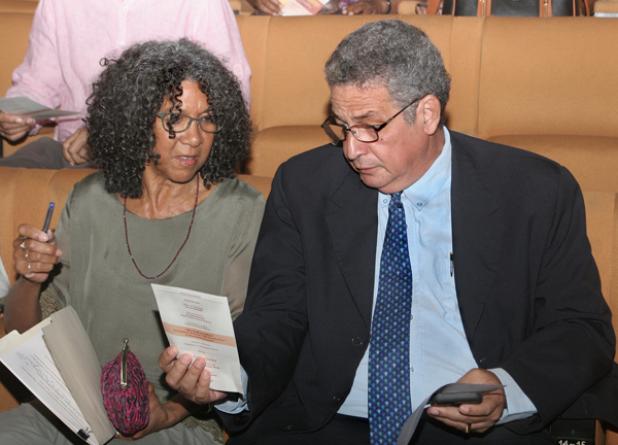
Featured lecturer Professor Kamala Kempadoo (left) shares a word with Director of SALISES of the UWI Professor Patrick Watson before the start of the Sir Arthur Lewis Distinguished Lecture at the Frank Collymore Hall on Wednesday night.
Professor: Decriminalisation of prostitution way to go
Fri, 04/01/2016 - 12:00am
A CASE has been made for the decriminalisation of prostitution in the region.
Delivering the Sir Arthur Lewis distinguished lecture on Wednesday night at the Frank Collymore Hall, under the topic “Who Trafficking What? The Caribbean and The Human Trafficking Discourse,” visiting Professor Kamala Kempadoo sought to identify the benefits of such a move, while denouncing any associated violence which she said would be a criminal act.
“Prostitution cannot automatically be construed as violence to women or enslavement. We need a more complex conceptualisation of sexual labour and the ways in which we then participate in sexual economic activities. As well as more critical examinations and ideologies about sexuality in order to dispel the moral indignation and stigma that surrounds sexual inclinations.”
“In tandem, and I know this is controversial, the decriminalisation of prostitution would go a long way towards making the sex trade a safer place to work and could elimination underhand deals, extortions, false promises, criminalisation of sex workers by immigration, smuggling of persons... It could allow working women to get access to State protection, health care and rights,” said the professor in the Department of Social Sciences at York University.
Professor Kempadoo’s comments came as she highlighted the economic realities facing many women across the region. “Sex work or an exchange of sex for economic security is often a strategy that keeps families and communities afloat. It also affects many other areas of income generation and small business opportunities. Taxi driving, hotel, bar management, security services, hair and nail services. Anti-trafficking often robs many people of a livelihood not just the women,” she suggested.
She said the region is also being asked to comply with standards which do not gel with Caribbean practices. Notwithstanding, she noted that many Governments have been making concerted efforts to reach Tier 1 on the US Trafficking in Persons report, yet continue to fall short seemingly without evidence.
“Anti-trafficking is becoming an industry that is creating more unfreedoms than it does freedoms. It drains money and attention away from tackling the cases of poverty and inequality.”’
To this end she suggested that the Caribbean should keep resisting US policies of trafficking and international pressure to comply with prostitution and anti-migration interests. “These run counter to many Caribbean histories, practices and realities.”
The professor also suggested that fewer restrictions on migration must be made. “Immigration regulations need to be loosened rather than tightened. Ultimately this is controversial but it could undermine many of the undocumented and clandestine measures and routes people use to secure a better life for themselves and their families and drastically the need for what we call traffickers or smugglers.”
“When it comes to freedom of movement. We personally don’t want to be controlled and …many of us want to travel and move around the world so why do we want to impose that on others.”
To address sexual slavery, she opined that there would be a reliance on existing labour laws, health and safety regulations and human rights legislation. She suggested that it will also require the strengthening of social services and empowerment support for young women as well as youth and marginalised people. “I think these would have a far more impact than supporting the anti-trafficking industry,” the professor said. (JH)
